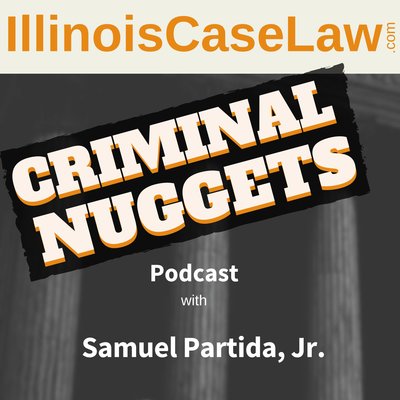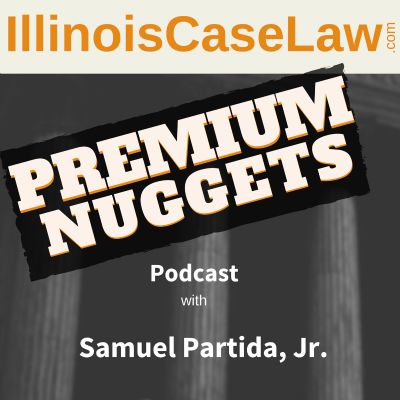Dec 26, 2014
http://IllinoisCaseLaw.com/when-does-double-jeopardy-attach-during-a-sentencing-hearing
When does double jeopardy attach during a sentencing hearing? This
is the question raised in Podcast Episode Number 040 of the
Criminal Nuggets Podcast. The Defendant tried to plead guilty to a
misdemeanor DUI, the the judge allowed them to dismiss the charges
so they could indict on felony charges.
[powerpress]
See People v. Guillen, 2014 IL App (2d) 131216 (11/25/2014).
Facts
Defendant was charged with misdemeanor DUI. Defendant plead guilty to that offense in a cold plea. In the middle the hearing, after the court admonished Defendant and "accepted" his guilty plea, but before the court entered a judgement and sentenced Defendant the State moved to nolle pros the charges.
The State had realized that because of his prior DUI conviction that the current charges could be enhanced to a felony.
The court granted the motions to dismiss the misdemeanor.
Charges
Defendant was then charged by indictment with two counts of aggravated DUI, a felony, pursuant to the Illinois Compiled Statutes Traffic Code section 11-501(d)(1)(D) of the Code (625 ILCS 5/11-501(d)(1)(D)).
The indictment alleged that the defendant had previously been convicted of DUI that resulted in great bodily harm to another and the defendant had driven while under the influence of alcohol (count I) and while having a blood alcohol concentration of 0.08 or greater (count II).
Issue: When Does Double Jeopardy Attach During a Sentencing Hearing?
Was Defendant subjected to double jeopardy after he had plead guilty to the misdemeanor offense but before he was sentenced?
Law on Double Jeopardy
The double jeopardy clause protects against multiple prosecutions and multiple punishments for the same offense by forbidding three things: a second prosecution for the same offense after an acquittal, a second prosecution for the same offense after a conviction, and multiple punishments for the same offense. See North Carolina v. Pearce, 395 U.S. 711, 717 (1969); U.S. Const., amend. V; Ill. Const. 1970, art. I, § 10, and 720 ILCS 5/3-4(a).
The Supreme Court has explained:
“When a defendant has been once convicted and punished for a particular crime, principles of fairness and finality require that he not be subjected to the possibility of further punishment by being again tried or sentenced for the same offense. When a defendant has been acquitted of an offense, the Clause guarantees that the State shall not be permitted to make repeated attempts to convict him, ‘thereby subjecting him to embarrassment, expense and ordeal and compelling him to live in a continuing state of anxiety and insecurity, as well as enhancing the possibility that even though innocent he may be found guilty.’ ”
United States v. Wilson, 420 U.S. 332, 343 (1975) (quoting, 355 U.S. 184, 187-88 (1957)).
Determining whether the double jeopardy clause is violated by a second proceeding against a defendant involves two steps.
First, we ask if the defendant was placed in jeopardy during the first proceeding. See Bellmyer, 199 Ill. 2d at 537.
Second, if yes we ask if a second proceeding may, nonetheless, proceed. See Id.; cf. 720 ILCS 5/3-4(a)(3), (d)(2) (second prosecution permitted where the first prosecution was not “terminated improperly,” or where the conviction resulting from the first prosecution was later invalidated, set aside, reversed, or vacated, so long as the defendant was not thereby found not guilty).
The United States Supreme Court has set bright-line rules about the point at which jeopardy attaches in a trial before a jury or a judge.
Jury Trial
In a jury trial, “ ‘jeopardy attaches when the jury is empaneled and sworn.’ ” Martinez v. Illinois, 134 S. Ct. 2070, 2074 (2014) (quoting Crist v. Bretz, 437 U.S. 28, 35 (1978)).
Bench Trial
In a bench trial, “jeopardy attaches when the court begins to hear evidence.” Serfass v. United States, 420 U.S. 377, 388 (1975). Illinois law applies these same tests in the context of jury and bench trials. Cabrera, 402 Ill. App. 3d at 447.
Sentencing Hearing
The law is not so clear on a guilty plea before sentencing. The case law has established that during a plea jeopardy attaches when the trial court accepts the guilty plea. See People v. McCutcheon, 68 Ill. 2d 101, 106 (1977).
But “[t]he Illinois Supreme Court thus has not decided whether, when a trial court begins to accept a guilty plea but then vacates that plea during the same hearing, it has “accepted” the plea so as to cause jeopardy to attach.” ¶ 35
Did Jeopardy Attach With Before The Dismissal?
One jude on this three judge appellate panel decided the case on substantial outside authority.
This judge pointed out that “[t]here is, of course, no absolute right to have a guilty plea accepted” and such acceptance is within the sound discretion of the trial court. Santobello v. New York, 404 U.S. 257, 262 (1971).
The appellate court preferred to grant the trial judge the authority to vacate a guilty plea before the plea was accepted in an final and unconditional manner. This made sense because -
- Trial Judge Should Have Broad Discretion
- Judge In Sentencing Hearing Is Gathering The Facts
- Additional Information May Come to Light
- Vacating Plea May Become Proper
This case illustrates why we would want to give the judge broad discretion in accepting pleas.
The State nor the defense agreed on the minimum sentence nor the factual basis for the plea. The judge was basically trying to gather all this information during this plea and sentencing hearing.
When it became apparent to the judge that the case was more serious than what first appeared it made sense to allow him to reject the plea so the State could dismiss the charges.
The defendant never faced any meaningful jeopardy nor could he expect any degree of finality merely from the fact that the trial court began to discuss sentencing issues during the same hearing.
Even if There Was Jeopardy, Should Prosecution Be Allowed to Proceed?
We are all familiar with retrials after trial error when there was sufficient evidence presented at trial to convict.
Similarly, the case law allows a trial judge to reject a sentence plea in the middle of the guilty plea hearing and reset the case for trial when the accused makes a statement of innocence. See People v. Cabrera, 402 Ill. App. 3d 440, 453 (2010).
Additionally, when ruling that a subsequent prosecution should be allowed to proceed, the appellate court pointed out the following things:
- Illinois law does not limit the trial court’s power to reject a guilty plea to situations in which a defendant asserts his innocence. See, e.g., Ill. S. Ct. R. 402(d)(2) .
- Illinois law allows the State to amend the charges against the defendant at any time prior to trial, including any amendment necessary to comply with notice requirements. See 725 ILCS 5/111-3(d).
The State and the trial court realized during the initial plea hearing that the offense amounted to felony DUI rather than the misdemeanor. The State’s motion to nol-pros the charges to which a defendant had begun to plead guilty was not brought for an improper reason. Thus, the trial court could properly terminate the plea proceeding, vacate the plea, and grant the State’s motion without violating the policies that underlie the double jeopardy protection.
Holding
“Any “acceptance” of the plea was preliminary rather than unconditional, and thus the defendant was never placed in jeopardy.” ¶ 48.
Trial court’s dismissal of the felony charges is reversed.
The defendant here did not face “‘the unfair harassment of successive trials’”, and double jeopardy did not bar the subsequent prosecution of the defendant. McCutcheon, 68 Ill. 2d at 106; quoting United States v. Goldman, 352 F.2d 263, 266 (3d Cir. 1965).
The Dissent
The dissent in this case brought up interesting and powerful counterpoints:
- Policy wide analysis conducted by the majority not necessary
- Supreme Court was clear that jeopardy attaches upon acceptance of guilty plea
- Appellate Court was only tasked with determining if the plea was accepted
- Appellate Court was not assigned with reevaluating the entire state of the law
See Bellmyer, 199 Ill. 2d at 540; Jackson, 118 Ill. 2d at 188-89; People v. McCutcheon, 68 Ill. 2d 101, 106 (1977).
The dissent wrote that -
“Moreover, our supreme court’s focus on whether a plea is accepted leaves little room for the consideration of policy matters underlying a defendant’s double-jeopardy protections, such as the defendant’s interest in finality and the possibility of overreaching by the State. See State v. Thomas, 995 A.2d 65, 76 (Conn. 2010).
Instead, the sole issue is whether the plea was accepted. ¶ 71.
The dissent justice felt that “[i]n this case, a review of the transcript of the sentencing hearing clearly shows that, by the time the State moved to nol-pros the charges, the trial court was in the process of sentencing defendant. Since the court was sentencing defendant, a fortiori, it must have already accepted his plea.” ¶ 72.
The dissenting judge simply could not agree that the plea had not been accepted by this point. The jackson court infers that when there is nothing else to be done to determine guilty then jeopardy attaches. People v. Jackson, 118 Ill. 2d 179, 189 (1987).
“To conclude, common sense dictates that a plea must be accepted before a sentence is imposed. That is precisely what occurred here.” ¶ 81.
Final Nugget
As a practical matter, one has to wonder if this case has in effect moved the gold post. The law use to be that jeopardy attached during a sentencing hearing sometime after a guilty plea is entered and before sentencing.
This case seems to suggest that the a judge can deny a plea right to those seconds before sentencing without jeopardy attaching.



